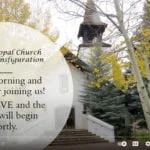Today is the Fourth Sunday After the Epiphany. We are past mid-point of Epiphanytide with an earlier Easter, and our Sunday lections invited thoughtful epiphanic reflection. I’d like to privilege just one short but powerful couplet from today’s Psalm, Psalm 111:10: The fear of the Lord is the beginning of wisdom; all those who practice it have a good understanding. His praise endures forever. The Hebrew term we translate simplistically as fear is יִרְאָה, yirah in transliteration, used in scripture 515 times! Interestingly it’s a feminine noun. Of course the original understanding of fear is the same as in English, dread or terror. But the brilliance of Jewish theology is on full display as this term develops over time to mean reverence, morality, or piety towards God. Wow. Our ancient Hebrew forebears well understood that reverencing God came from the same primordial emotive gut locale as did our innate fight or flight response, a pre-logical trigger responsible for involuntary neurological body reflexes, although, uh, er, they may have articulated it a bit differently!
The Psalmist takes that involuntary nature of fearing God one giant leap further, connecting yirah with חָכְמָה, khokmah(the first syllable sounds like you’re coughing something up), or Wisdom. From proper reverence comes foundational wisdom, claims the Psalmist, and even further, without this reverent piety towards God one can never find authentic wisdom. Whew, as controversial today as it must have been then! And both are incontrovertibly interlinked with the gut of all human emotion. Our Jewish forebears were not tea-sipping Alexandrian Library Egyptians pondering the mysteries of life while the cool afternoon breezes of the western Mediterranean swept through the lavish academic halls of some ivory library tower. Pffeeeeeffaaww. Urgh, Lord no! They were Semitic, born in the forbidding wastes of the Judean or Sinaitic wilderness, and had no time for Hellenistic niceties. Hebrew doesn’t even have a neuter gender, so everything was either male or female, just like the world they saw around them.
Nope, nothing too fancy for them. To be wise is to feel God, to know and be known by the Creator of the Heavens and the Earth intimately, to be reverent and pietistic in approaching their world. For our faith not to spring from our heads but from somewhere more visceral. Join me today in celebrating that anonymous ancient Psalmist and ponder where true wisdom is to be found. Where the wisdom derives, there God’s Epiphany lies.






